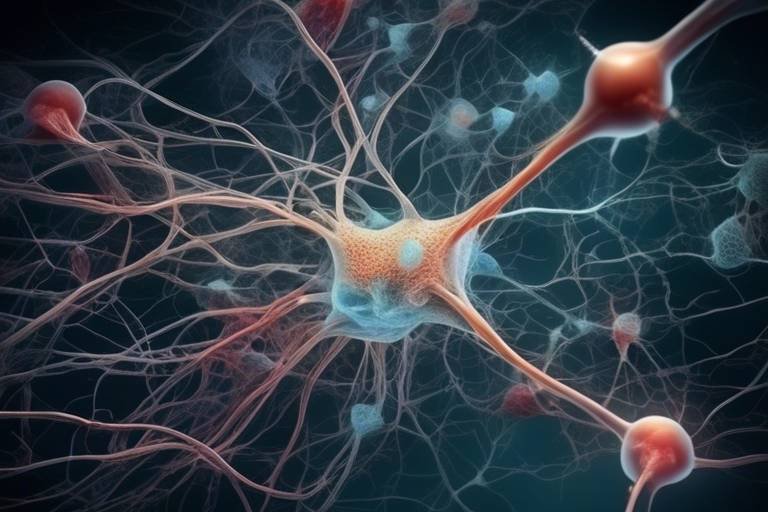Ontology - The Next Step in Neurological Research
In the ever-evolving field of neuroscience, researchers are constantly on the lookout for innovative tools and methodologies that can enhance their understanding of the brain. One such groundbreaking approach is ontology, which is revolutionizing how we structure and interpret complex data. Imagine trying to solve a jigsaw puzzle without knowing what the final picture looks like. That's how many researchers feel when they sift through vast amounts of neurological data without a clear framework. Ontology acts as that guiding picture, providing a structured representation of knowledge that categorizes and relates various concepts within neuroscience.
By employing ontology, researchers can not only organize their findings but also communicate more effectively across various disciplines. This is particularly important in a field as intricate as neuroscience, where the interplay between different neural networks and functions can be both fascinating and perplexing. With ontology, the chaos of information transforms into a coherent narrative, allowing for a deeper understanding of brain functions and disorders.
Moreover, ontology is not just about organization; it’s about integration. As the field of neuroscience continues to grow, the amount of data generated from various studies increases exponentially. Ontology facilitates the integration of these diverse data sources, enabling researchers to combine findings from multiple studies. This collective knowledge enhances our understanding of neurological conditions, making it easier to identify patterns and relationships that might otherwise go unnoticed.
In the coming sections, we will delve deeper into the role of ontology in data integration, its applications in neurological disorders, and its impact on treatment development. As we explore these facets, you'll see how ontology is not just a tool, but a vital component in the quest to unravel the mysteries of the human brain.
Ontology provides a structured representation of knowledge, allowing researchers to categorize and relate concepts in neuroscience, which is vital for advancing our understanding of brain functions and disorders. By creating a common framework, ontology helps bridge the gaps between different research studies and disciplines, enabling a more holistic view of neurological phenomena.
In neurological research, ontology facilitates the integration of diverse data sources, enabling researchers to combine findings from various studies and enhance the overall knowledge base regarding neurological conditions. This integration is crucial, as it allows for a more comprehensive understanding of how different factors interact within the brain.
Standardized terms within ontology improve communication among researchers, ensuring that everyone interprets data consistently, which is crucial for collaborative efforts in the complex field of neuroscience. When researchers use a common vocabulary, it reduces the risk of misunderstandings and misinterpretations, paving the way for more productive collaboration.
A shared vocabulary in ontology reduces ambiguity and confusion, promoting clearer discussions and more accurate data analysis in neurological research, ultimately leading to better outcomes. It’s like having a common language in a diverse group; when everyone speaks the same language, ideas flow more freely, and innovation thrives.
Despite its advantages, achieving standardization in terminology presents challenges, including differing interpretations and the need for consensus among researchers in the field of neuroscience. The diversity of thought and approach can sometimes lead to fragmented understanding, but the ongoing development of ontology aims to address these issues.
Ontology aids in data discovery by providing a framework for tagging and retrieving relevant information, making it easier for researchers to find pertinent studies and datasets in neurological research. Imagine searching for a needle in a haystack; ontology helps to ensure that the needle is not only found but also understood in the context of the broader haystack.
Ontology plays a significant role in understanding and categorizing neurological disorders, offering insights into their mechanisms, symptoms, and potential treatments through structured knowledge representation. By using ontology, researchers can map out the complexities of various disorders, leading to more effective strategies for diagnosis and treatment.
In Alzheimer’s research, ontology has been utilized to organize knowledge about the disease, facilitating better understanding of its pathology and guiding the development of targeted therapies. This structured approach allows researchers to identify critical relationships between symptoms and underlying biological processes, ultimately enhancing treatment efficacy.
The structured knowledge provided by ontology accelerates the development of treatments by identifying relationships between symptoms, biomarkers, and therapeutic targets in various neurological disorders. By connecting the dots, ontology paves the way for more personalized and effective treatment strategies, which is a game-changer in the fight against neurological diseases.
- What is ontology in neuroscience? Ontology in neuroscience refers to a structured framework that organizes knowledge, allowing researchers to categorize and relate concepts effectively.
- How does ontology aid in data integration? Ontology facilitates the integration of diverse data sources, enabling researchers to combine findings from various studies for a more comprehensive understanding.
- What are the benefits of a shared vocabulary? A shared vocabulary reduces ambiguity, enhances communication, and promotes clearer discussions, leading to better research outcomes.
- What challenges exist in standardizing terminology? Differing interpretations and the need for consensus among researchers can pose challenges in achieving standardization in terminology.

Understanding Ontology in Neuroscience
Ontology in neuroscience is like a well-organized library where every book (or in this case, concept) is meticulously categorized and labeled. This structured representation of knowledge allows researchers to categorize and relate various concepts, which is absolutely vital for advancing our understanding of brain functions and disorders. Think of ontology as a map that guides researchers through the complex landscape of neurological research, helping them navigate through intricate neural networks and the myriad of terms that can often lead to confusion.
At its core, ontology provides a framework that helps in defining the relationships between different entities in neuroscience. For instance, it allows researchers to connect symptoms of neurological disorders with their underlying biological mechanisms. By establishing these connections, ontology enhances our ability to understand how different elements within the nervous system interact with one another. This is particularly important when we consider the complexity of the brain, where a single neurotransmitter can influence multiple pathways and, consequently, various behaviors and conditions.
Moreover, ontology encourages collaboration among researchers by providing a common language. In a field as diverse as neuroscience, where professionals come from various disciplines—ranging from biology to psychology—having a standardized vocabulary is crucial. It ensures that when one researcher refers to a particular term, others understand precisely what is meant. This reduces the risk of miscommunication and fosters a more cohesive research environment.
For example, consider the term "neuroplasticity." Without a clear definition and understanding of how this term relates to other concepts, researchers might interpret it differently, leading to fragmented research efforts. Ontology helps mitigate these issues by offering a structured approach to defining such terms and their interrelations. This structured representation not only aids in clarity but also enhances the overall quality of research outputs.
In addition to improving communication, ontology also plays a pivotal role in data integration. In the vast realm of neurological research, data is often collected from various sources, including clinical trials, observational studies, and genetic analyses. Ontology provides a way to integrate these diverse data sets, allowing researchers to draw comprehensive conclusions and make informed decisions. By organizing data in a structured manner, ontology facilitates more effective data discovery, enabling researchers to quickly locate relevant studies and datasets that can inform their work.
Ultimately, understanding ontology in neuroscience is about recognizing its power to transform how we approach research. It provides a scaffold upon which we can build our understanding of the brain, allowing for more precise questions to be asked and more accurate answers to be found. As we continue to explore the depths of neurological science, ontology stands out as a crucial tool that enhances our ability to decode the mysteries of the human brain.

The Role of Ontology in Data Integration
In the fast-paced world of neurological research, the ability to integrate diverse data sources is nothing short of revolutionary. Imagine trying to solve a complex puzzle where the pieces come from different boxes; that’s what researchers face when dealing with various studies, datasets, and findings. This is where ontology steps in as a powerful ally. By providing a structured framework, ontology allows researchers to bring together disparate pieces of information into a cohesive whole, enhancing our understanding of neurological conditions.
At its core, ontology acts as a bridge that connects various data types, whether they are clinical trial results, imaging data, or genetic information. This integration is crucial because neurological disorders often manifest through a multitude of factors that interact in complex ways. For example, consider the intricate web of connections between genetic predispositions, environmental influences, and lifestyle choices. Ontology enables researchers to map these relationships systematically, which can lead to groundbreaking insights.
Furthermore, ontology supports the integration of data by standardizing how information is categorized. This standardization ensures that when researchers refer to certain concepts—like “neurodegeneration” or “synaptic plasticity”—everyone is on the same page. This clarity is vital in collaborative efforts, where multiple researchers from different backgrounds and disciplines are working together. Without a common language, misunderstandings can easily arise, leading to fragmented findings and missed opportunities for advancement.
To illustrate the impact of ontology in data integration, let’s consider a few key benefits:
- Enhanced Collaboration: With standardized terms and a shared framework, researchers can collaborate more effectively, pooling their knowledge and resources for greater impact.
- Improved Data Retrieval: Ontology provides a structured way to tag and retrieve information, making it easier for researchers to locate relevant studies and datasets.
- Comprehensive Understanding: By integrating various data sources, ontology allows for a more holistic view of neurological disorders, paving the way for innovative research and treatment approaches.
However, integrating data through ontology is not without its challenges. Researchers must navigate issues such as differing interpretations of terms and the need for consensus on standards. The journey towards achieving a fully integrated data landscape in neuroscience is ongoing, but the potential rewards are immense. As researchers continue to embrace ontology, we can expect to see a more interconnected and informed approach to understanding the brain and its myriad complexities.
- What is ontology in the context of neuroscience?
Ontology in neuroscience refers to a structured representation of knowledge that categorizes and relates concepts, facilitating better understanding and communication among researchers. - How does ontology enhance data integration?
Ontology enhances data integration by providing standardized terminology and a framework that allows researchers to combine findings from various studies, leading to a more comprehensive understanding of neurological conditions. - What are the challenges of using ontology in neurological research?
Challenges include differing interpretations of terms and achieving consensus among researchers on standardized vocabulary, which can complicate collaborative efforts.

Standardizing Terminology
In the realm of neuroscience, the importance of cannot be overstated. Imagine a world where every researcher, clinician, and even patient speaks the same language when it comes to understanding complex neural mechanisms. This is precisely what ontology aims to achieve. By establishing a common lexicon, ontology ensures that terms are not only defined but also universally understood across the diverse landscape of neurological research.
Consider this: if one researcher refers to a "neural pathway" and another uses the term "nerve tract," confusion is bound to arise. This discrepancy can lead to misinterpretations of data, wasted resources, and ultimately, hindered progress in our understanding of the brain. Therefore, standardizing terminology is crucial for fostering clear communication and collaboration among researchers. It acts as a bridge that connects various disciplines within neuroscience, from molecular biology to cognitive psychology.
Moreover, a standardized vocabulary enhances the reproducibility of research findings. When terms are consistently used, it becomes easier to replicate studies, verify results, and build upon previous work. This is essential in a field where the nuances of language can significantly alter the interpretation of data. Researchers can focus on what truly matters—advancing our knowledge of neurological disorders—rather than getting bogged down in semantic debates.
To illustrate the impact of standardized terminology, let's look at a few key benefits:
- Improved Communication: A shared vocabulary allows researchers to exchange ideas and findings without ambiguity, ensuring that everyone is on the same page.
- Enhanced Collaboration: When researchers use the same terms, it facilitates multidisciplinary collaborations, allowing for a more holistic approach to understanding neurological conditions.
- Streamlined Data Analysis: Standardized terms make it easier to categorize and analyze data, leading to more accurate conclusions and insights.
However, achieving this standardization is not without its challenges. Different interpretations of terms can arise from varying academic backgrounds, cultural contexts, and even personal experiences. As a result, reaching a consensus among researchers can be a daunting task. Nevertheless, the benefits of standardizing terminology far outweigh the hurdles. By working together to establish a common language, the neuroscience community can not only enhance the clarity of their discussions but also pave the way for groundbreaking discoveries.
In summary, standardizing terminology through ontology is a vital step in neurological research. It fosters better communication, enhances collaboration, and streamlines data analysis, ultimately driving progress in our understanding of the brain and its disorders. As researchers continue to embrace this structured approach, we can look forward to a future where the complexities of neuroscience are navigated with greater ease and precision.

Benefits of a Shared Vocabulary
One of the most significant advantages of utilizing a shared vocabulary in ontology is the reduction of ambiguity. Imagine trying to communicate a complex idea to someone who speaks a different language; without a common lexicon, misunderstandings are almost inevitable. In the realm of neuroscience, where every term can hold profound implications for research and treatment, having a standardized vocabulary is essential. This shared language allows researchers to clearly articulate their findings, hypotheses, and methodologies, leading to more productive discussions and collaborations.
Moreover, a shared vocabulary enhances data analysis. When researchers use consistent terms to describe their work, it becomes much easier to compare and contrast studies. For instance, if one researcher refers to a specific neural pathway using one term, while another uses a different term for the same pathway, it can lead to confusion and misinterpretation of results. By standardizing terminology, researchers can ensure that they are all on the same page, which is crucial for drawing accurate conclusions from collective data.
Additionally, a shared vocabulary promotes interdisciplinary collaboration. Neuroscience often intersects with various fields such as psychology, genetics, and even computer science. When experts from different backgrounds come together, they bring their own terminologies and frameworks. A common vocabulary helps bridge these gaps, fostering a collaborative environment where ideas can flow freely. This synergy can lead to innovative approaches to tackling neurological disorders and developing effective treatments.
However, establishing a shared vocabulary is not without its challenges. Researchers must engage in ongoing discussions to reach a consensus on terms and definitions. This process requires patience and a willingness to adapt. Nevertheless, the benefits far outweigh the difficulties, as a shared vocabulary not only streamlines communication but also enriches the overall research ecosystem. In conclusion, the implementation of a shared vocabulary in ontology is a powerful tool that enhances clarity, promotes collaboration, and ultimately drives progress in understanding and treating neurological conditions.

Challenges in Standardization
Standardization in the realm of ontology is a noble pursuit, but it comes with its own set of hurdles that can feel as daunting as scaling a mountain. One of the primary challenges is the **diverse interpretations** of terms and concepts within neuroscience. Each researcher may have a slightly different understanding of a term based on their background, experiences, or even the specific focus of their studies. This variability can lead to inconsistencies in data interpretation and, ultimately, hinder collaborative efforts.
Another significant challenge is the **need for consensus** among researchers. With so many stakeholders involved—from neuroscientists to clinicians and even bioinformaticians—reaching an agreement on standardized terminology can be like herding cats. Each group may prioritize different aspects of neurological research, making it difficult to establish a unified vocabulary that everyone can adopt. Without this consensus, the potential benefits of ontology are diminished, as researchers may continue to speak different languages, metaphorically speaking.
Moreover, the constantly evolving nature of neuroscience means that new discoveries can render existing terms obsolete or necessitate the creation of new ones. This is akin to trying to build a bridge while the river is still flowing; as researchers make strides in understanding the brain, the vocabulary must adapt to reflect these advancements. Thus, the challenge lies not only in standardizing existing terms but also in ensuring that the vocabulary remains relevant and encompasses new findings.
Lastly, the **implementation of standardized terms** across various platforms and databases presents yet another layer of complexity. Different institutions may use varying systems for data management, which can lead to fragmentation. Imagine trying to piece together a jigsaw puzzle where the pieces come from multiple boxes—without a cohesive standard, the picture remains incomplete. To tackle this, there needs to be a concerted effort to develop interoperable systems that can accommodate standardized vocabularies while allowing for the flexibility required by ongoing research.
In summary, while the challenges of standardization in ontology for neurological research are significant, they are not insurmountable. Ongoing dialogue among researchers, investments in technology, and a commitment to collaborative science can pave the way for a more unified approach. By addressing these challenges head-on, the field can harness the full potential of ontology to enhance our understanding of the brain and its myriad complexities.
- What is ontology in neuroscience? Ontology in neuroscience refers to a structured representation of knowledge that categorizes and relates concepts, enhancing understanding of brain functions and disorders.
- Why is standardization important in neurological research? Standardization ensures consistent interpretation of data among researchers, facilitating collaboration and improving the quality of research outcomes.
- What are the challenges of achieving standardization? Challenges include diverse interpretations of terms, the need for consensus among researchers, the evolving nature of neuroscience, and implementation across different platforms.
- How does ontology aid in data discovery? Ontology provides a framework for tagging and retrieving relevant information, making it easier for researchers to locate pertinent studies and datasets.

Enhancing Data Discovery
In the rapidly evolving field of neurological research, has become a pivotal goal. As researchers dive deeper into the complexities of the brain, they are faced with an overwhelming amount of data from various studies, experiments, and clinical trials. The challenge lies not just in collecting this data, but in making sense of it. This is where ontology comes into play, acting as a beacon of clarity amidst the chaos.
Ontology provides a structured framework that allows researchers to tag, organize, and retrieve information efficiently. Imagine walking into a library with thousands of books scattered everywhere; it would be nearly impossible to find the one you need. Now, picture that same library with a well-organized cataloging system. You can easily locate the book you want based on categories, authors, or subjects. Similarly, ontology streamlines the process of data discovery in neurological research.
One of the key advantages of using ontology in data discovery is its ability to integrate diverse datasets. Researchers can pull information from different studies and databases, allowing for a more comprehensive understanding of neurological conditions. For instance, consider a researcher studying Parkinson's disease. By utilizing ontology, they can access a wealth of information, including genetic data, clinical symptoms, and treatment outcomes, all linked through a common framework. This interconnectedness not only saves time but also enhances the quality of research.
Furthermore, ontology aids in the discovery of patterns and relationships within data. By categorizing information systematically, researchers can identify trends that may not be immediately apparent. For example, if multiple studies report similar symptoms linked to specific biomarkers, ontology helps to highlight these connections, paving the way for new hypotheses and research directions.
To illustrate how ontology enhances data discovery, consider the following table that outlines key features and benefits:
| Feature | Benefit |
|---|---|
| Structured Framework | Facilitates easy navigation and retrieval of data |
| Data Integration | Combines findings from diverse sources for comprehensive insights |
| Pattern Recognition | Identifies trends and relationships within datasets |
| Standardized Terminology | Ensures consistent interpretation of data across studies |
In conclusion, the role of ontology in enhancing data discovery cannot be overstated. It transforms the way researchers access and interpret information, ultimately leading to more informed conclusions and advancements in the field of neuroscience. As we continue to unravel the mysteries of the brain, ontology will undoubtedly play a crucial role in guiding our journey.
- What is ontology in the context of neuroscience?
Ontology refers to a structured representation of knowledge that helps researchers categorize and relate concepts within neuroscience. - How does ontology improve data discovery?
Ontology enhances data discovery by providing a framework for organizing and tagging information, making it easier for researchers to retrieve relevant studies and datasets. - What are the benefits of using standardized terminology?
Standardized terminology reduces ambiguity, improves communication among researchers, and ensures consistent interpretation of data. - Can ontology help in treatment development?
Yes, ontology accelerates treatment development by identifying relationships between symptoms, biomarkers, and therapeutic targets.

Applications of Ontology in Neurological Disorders
Ontology is revolutionizing our approach to understanding neurological disorders by providing a structured framework that categorizes and relates various aspects of these complex conditions. By organizing knowledge in a systematic way, ontology helps researchers and clinicians to delve deeper into the mechanisms underlying disorders such as Alzheimer's, Parkinson's, and multiple sclerosis. This structured representation allows for a clearer understanding of how symptoms, genetic factors, and environmental influences interact, ultimately leading to improved diagnostic and therapeutic strategies.
One of the most significant applications of ontology in neurological disorders is its ability to facilitate the integration of diverse data sources. Imagine trying to solve a jigsaw puzzle where the pieces come from different boxes—this is often the case in neurological research. By using ontology, researchers can effectively fit these disparate pieces together, creating a comprehensive picture of a disorder. For instance, ontological frameworks can integrate clinical data, imaging results, and genetic information, allowing for a more holistic view of a patient's condition.
Additionally, ontology plays a crucial role in enhancing communication among researchers. In a field as intricate as neuroscience, where terminologies can vary widely, a shared vocabulary is essential. When researchers utilize standardized terms within an ontological framework, they can communicate findings more effectively, ensuring that everyone is on the same page. This is particularly important in collaborative projects where multiple teams contribute to the same research question.
Moreover, ontology aids in identifying relationships between various elements associated with neurological disorders. For example, researchers can explore how specific biomarkers correlate with symptoms and treatment responses. By mapping these relationships, ontology not only enhances our understanding of the disorders but also accelerates the development of targeted therapies. When researchers know which biomarkers are linked to certain symptoms, they can devise more effective treatment plans tailored to individual patients.
To illustrate the impact of ontology in neurological disorders, let’s take a look at some real-world applications:
| Neurological Disorder | Application of Ontology | Outcome |
|---|---|---|
| Alzheimer's Disease | Organizing knowledge about pathology and symptoms | Improved understanding and targeted therapies |
| Parkinson's Disease | Linking genetic factors to clinical symptoms | Personalized treatment approaches |
| Multiple Sclerosis | Integrating clinical and imaging data | Enhanced diagnostic accuracy |
In conclusion, the applications of ontology in neurological disorders are vast and transformative. By providing a structured approach to data organization and enhancing communication among researchers, ontology not only improves our understanding of complex brain conditions but also leads to better treatment outcomes. As we continue to explore the depths of the human brain, ontology will undoubtedly remain a key player in the quest for effective therapies and a deeper understanding of neurological health.
Q: What is ontology in the context of neuroscience?
A: Ontology in neuroscience refers to a structured framework that categorizes and relates concepts, allowing researchers to better understand and communicate about complex neurological phenomena.
Q: How does ontology improve data integration?
A: Ontology facilitates the integration of diverse data sources by providing standardized terms and relationships, making it easier for researchers to combine findings from different studies.
Q: What are the benefits of a shared vocabulary in neurological research?
A: A shared vocabulary reduces ambiguity, enhances communication, and promotes clearer discussions among researchers, ultimately leading to more accurate data analysis and better research outcomes.
Q: Can ontology help in developing new treatments for neurological disorders?
A: Yes, ontology helps identify relationships between symptoms, biomarkers, and therapeutic targets, accelerating the development of targeted therapies for various neurological conditions.

Case Studies in Alzheimer’s Research
Alzheimer's disease, a complex and devastating neurological disorder, has been the focus of numerous research efforts aimed at understanding its underlying mechanisms and potential treatments. One of the most significant advancements in this field has been the application of ontology, which has enabled researchers to systematically organize and analyze vast amounts of data related to Alzheimer's. By creating structured frameworks that categorize symptoms, biomarkers, and genetic factors, ontology has transformed the landscape of Alzheimer's research.
For instance, one notable case study utilized ontology to examine the relationship between amyloid plaques and tau protein tangles, two hallmark features of Alzheimer's pathology. Researchers employed a structured ontology to define and relate various concepts, such as the progression of these pathological features, cognitive decline, and potential therapeutic interventions. This approach not only clarified the connections between different aspects of the disease but also highlighted gaps in existing research, guiding future studies.
Another compelling case study focused on the integration of clinical data from diverse sources, including electronic health records, genetic databases, and neuroimaging results. By applying ontology, researchers were able to create a unified model that linked patient symptoms with underlying biological processes. This integration facilitated the identification of specific biomarkers that could predict disease progression, thus paving the way for more personalized treatment strategies.
Moreover, ontology has been instrumental in fostering collaboration among researchers. By establishing a common vocabulary and framework, scientists from various disciplines can share insights and findings more effectively. This collaborative spirit is essential for tackling the multifaceted challenges posed by Alzheimer's disease. For example, a consortium of researchers might use a shared ontology to discuss the implications of new genetic findings, allowing for a more comprehensive understanding of how these factors contribute to the disease.
In summary, the use of ontology in Alzheimer's research is proving to be a game-changer. By organizing knowledge in a structured way, researchers can uncover new insights, identify relationships between various disease components, and ultimately enhance the development of targeted therapies. As we continue to explore the complexities of Alzheimer's, ontology will undoubtedly play a crucial role in shaping the future of neurological research.
- What is ontology in the context of neuroscience?
Ontology refers to a structured representation of knowledge that helps categorize and relate concepts within the field of neuroscience, facilitating better understanding and communication among researchers. - How does ontology aid in data integration?
Ontology allows researchers to combine findings from various studies and data sources, creating a cohesive knowledge base that enhances our understanding of neurological conditions. - What are some challenges faced in standardizing terminology?
Challenges include differing interpretations of terms and the need for consensus among researchers, which can hinder effective communication and collaboration. - Can ontology improve treatment development for Alzheimer's?
Yes, by identifying relationships between symptoms, biomarkers, and therapeutic targets, ontology accelerates the development of targeted treatments for Alzheimer's and other neurological disorders.

Impacts on Treatment Development
In the ever-evolving landscape of neurological research, ontology is proving to be a game changer, particularly when it comes to treatment development. By providing a structured framework for understanding complex relationships between various aspects of neurological disorders, ontology accelerates the process of identifying potential therapies. Imagine trying to solve a jigsaw puzzle without knowing what the final picture looks like; ontology gives researchers that vital picture, allowing them to piece together intricate details of symptoms, biomarkers, and therapeutic targets.
One of the most significant impacts of ontology is its ability to connect disparate data points. For instance, in neurological disorders like Parkinson's disease, researchers can use ontology to map out how specific genetic markers relate to the disease's progression and symptoms. This mapping is not just a theoretical exercise; it has real-world implications for developing targeted treatments. By understanding these connections, researchers can prioritize which pathways to investigate further, making the treatment development process not only faster but also more efficient.
Moreover, ontology fosters collaboration among researchers from various disciplines. When everyone speaks the same language—thanks to standardized terminologies—collaborative efforts become more fruitful. Researchers can share findings and insights without the confusion that often arises from differing terminologies. This unity is crucial when developing treatments, as it allows for a more comprehensive understanding of how different factors interact in the disease process. For example, consider the collaboration between neurologists and pharmacologists; a shared ontology can help them align their research efforts to create more effective drug therapies.
To illustrate the practical benefits of ontology in treatment development, let’s take a look at some key areas where it has made a significant impact:
| Area of Impact | Description |
|---|---|
| Biomarker Discovery | Ontology helps identify and categorize biomarkers associated with specific neurological disorders, guiding researchers in their quest for effective treatments. |
| Clinical Trials | By standardizing terminologies, ontology streamlines the process of designing and conducting clinical trials, ensuring that everyone is on the same page. |
| Patient Stratification | Ontology aids in the classification of patients based on genetic and phenotypic data, allowing for more personalized treatment approaches. |
Additionally, ontology plays a crucial role in the regulatory approval process. Regulatory bodies often require extensive data to support the efficacy and safety of new treatments. By utilizing a well-structured ontology, researchers can present their findings in a clear and organized manner, making it easier for regulatory agencies to evaluate new therapies. This clarity not only speeds up the approval process but also increases the likelihood of successful outcomes.
In conclusion, the impacts of ontology on treatment development in neurological research are profound and far-reaching. By enhancing our understanding of the complex interactions within the brain, ontology not only accelerates the discovery of new treatments but also fosters collaboration and communication among researchers. As we continue to unravel the mysteries of neurological disorders, ontology will undoubtedly remain a cornerstone of our efforts, paving the way for innovative therapies that can transform the lives of those affected by these conditions.
- What is ontology in the context of neuroscience? Ontology in neuroscience refers to a structured framework that categorizes and relates concepts, enhancing our understanding of brain functions and disorders.
- How does ontology improve treatment development? By providing a clear representation of relationships between symptoms, biomarkers, and therapeutic targets, ontology accelerates the identification and development of new treatments.
- Can ontology help in clinical trials? Yes, ontology standardizes terminology and data organization, making it easier to design and conduct clinical trials effectively.
- What are the challenges of implementing ontology? Challenges include achieving consensus on standardized terms and addressing varying interpretations among researchers.
Frequently Asked Questions
- What is ontology in the context of neurological research?
Ontology in neurological research refers to a structured framework that organizes knowledge and categorizes concepts related to the brain and its functions. It helps researchers understand complex neural networks by providing a shared vocabulary and a way to relate various ideas and findings.
- How does ontology aid in data integration?
Ontology facilitates data integration by allowing researchers to combine findings from diverse studies and sources. This integration enhances the overall knowledge base regarding neurological conditions, making it easier to draw connections and insights across different research efforts.
- Why is standardizing terminology important in neuroscience?
Standardizing terminology is crucial in neuroscience because it ensures that researchers interpret and communicate data consistently. This clarity is vital for collaborative efforts, as it reduces misunderstandings and promotes more accurate data analysis.
- What are the benefits of a shared vocabulary in ontology?
A shared vocabulary in ontology minimizes ambiguity and confusion, leading to clearer discussions among researchers. It allows for more precise data analysis and ultimately contributes to better outcomes in neurological research.
- What challenges does standardization face in the field of neuroscience?
Standardization faces several challenges, including differing interpretations of terms and the need for consensus among researchers. These hurdles can slow progress but are essential to overcome for effective communication and collaboration.
- How does ontology enhance data discovery?
Ontology enhances data discovery by providing a structured framework for tagging and retrieving relevant information. This organization makes it easier for researchers to find pertinent studies and datasets, streamlining the research process.
- What role does ontology play in understanding neurological disorders?
Ontology plays a significant role in categorizing and understanding neurological disorders by offering structured knowledge representation. This helps researchers gain insights into the mechanisms, symptoms, and potential treatments for various conditions.
- Can you provide an example of ontology in Alzheimer's research?
In Alzheimer's research, ontology has been utilized to organize knowledge about the disease, which facilitates a better understanding of its pathology. This structured approach guides the development of targeted therapies aimed at treating the disease more effectively.
- How does ontology impact treatment development in neurology?
The structured knowledge provided by ontology accelerates treatment development by identifying relationships between symptoms, biomarkers, and therapeutic targets. This insight allows researchers to develop more effective treatments for various neurological disorders.



















